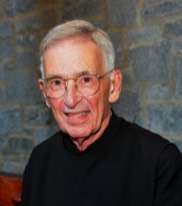The Society of Saint John the Evangelist
And Eldridge Pendleton
By: Rev. Gregory S. Neal
Studying for the ministry was, at times, a trying experience. My ability to stay up late into the night reading and writing, researching and studying was taxed to its very limit. The amazing depth and diversity of intellectual disciplines which I was required to master was, at times, overwhelming. And, finally, the demands of the local church and the hospital chaplaincy sapped every last ounce of physical and spiritual strength I had. They were difficult years--and I enjoyed it all immensely.
Of course, one might say that it was my own fault that my Seminary experience was so exhaustingly difficult. I didn’t have to study Latin, Greek and Hebrew, nor did I have to take all those upper-level PhD courses. But, I thought that if I was going to be at one of the premier Theological Seminaries in the world, I should take advantage of it (is my bias showing through?). And, so, I knocked myself out physically, mentally, and spiritually.
To keep myself healthy while under this amount of stress I did what each and every one of us must do: I got away. Each and every week, usually for just a couple of hours but sometimes for one or two days, I would escape the campus of Duke University and travel across the town of Durham, North Carolina, to a monastery of the Society of Saint John the Evangelist. St. John’s House is a beautiful, wood frame, 100 year old, three-story manor house. It is surrounded by a lovely, well kept yard and garden and is the perfect place to lose oneself when the pressures of life get too heavy. Along with a number of other ministerial students from Duke Divinity, I went each and every Saturday morning to worship, receive Holy Communion, and become re-energized for yet another weekend of ministry in my student pastorate. Without these Saturday mornings, I don’t think I would have survived.
St. John’s House was truly a remarkable place, and the monks who lived there were all remarkable men of God. During the three years that I went to St. John’s House I got to know many of the monks of the Society of Saint John the Evangelist (SSJE), and I learned much about their religious life and ministry.
SSJE is one of the oldest non-Roman Catholic monastic orders in western Christendom. Related to the Episcopal Church in America and the Church of England in Great Britain, the “Cowley Fathers,” as they are sometimes called, are in mission and ministry in many different ways. While they live in monasteries and abide by vows of poverty, chastity, and obedience, they are not “lost” to the world in their buildings: among the brothers of the Society there are teachers, musicians, pastors, preachers, students, scholars, spiritual directors, gardeners, authors, bakers, social workers, youth ministers, liturgists, editors, and even an active Bishop of the Episcopal Church. In the United States alone, the Society runs one of the world’s most influential religious publishing houses, 2 retreat centers, many out-reach and educational ministry programs, and a summer camp for inner-city youth. While they have, and have had, monasteries throughout the world, in the United States they have had only three Houses: one in Durham (which, since my graduation from seminary, has been closed), one in West Newbury Massachusetts, and their “Mother House” in Boston. Each House is open to all Christians, without regard to denomination, for retreats, worship, and spiritual direction. And, as was the case with me, they focus special attention upon the needs of the clergy and other “religious professionals.” Indeed, during my years at Duke the brothers at St. John’s House were very kind, open, and helpful to me in my ministry in The United Methodist Church. I made many friends among them, including one special Texan.

We can all look back in our lives and identify those special saints who have touched us in one way or another. Eldridge has truly been one of those saints in my life. He is a man of rare gentility and loving presence. He has an air of quiet humility that I pray, some day, may be given to me. He faces life with few fears, and always leaves a bit of his calming spirit with those he meets. He has a striking shyness that one might not expect from one so in-tune with the power of the Holy Spirit. I’ll never forget how, following the Saturday morning eucharists at St. John’s House, he would gaze into his hands, twiddle his fingers, cock his head to one side, and bashfully invite us to stay for coffee and breakfast. Never at home in the spotlight, Eldridge nevertheless was one of the most inspiring preachers in my seminary class. His words, drifting quietly across the chapel, could fill one with the calm assurance of the presence of the Holy Spirit. When Eldridge Pendleton preached, even the most erudite professor would stop day-dreaming and listen. Somehow, we knew that in Eldridge’s un-presupposing tones and Texas twang could be heard the voice of God.
© 1993 Rev. Gregory S. Neal
All Rights Reserved

As a popular teacher, preacher, and retreat leader, Dr. Neal is known for his ability to translate complex theological concepts into common, everyday terms. His preaching and teaching ministry is in demand around the world, and he is available for public engagements. He is the author of several books, including Grace Upon Grace: Sacramental Theology and the Christian Life, which is in its second edition, and Seeking the Shepherd's Arms: Reflections from the Pastoral Side of Life, a work of devotional literature. Both of these books are currently available from many book stores, including Cokesbury, Barnes And Noble, and Amazon.